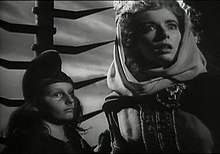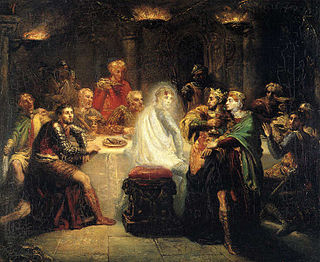
LordBanquo, the Thane of Lochaber, is a semi-historical character in William Shakespeare's 1606 play Macbeth. In the play, he is at first an ally of Macbeth and they meet the Three Witches together. After prophesying that Macbeth will become king, the witches tell Banquo that he will not be king himself, but that his descendants will be. Later, Macbeth in his lust for power sees Banquo as a threat and has him murdered by three hired assassins; Banquo's son, Fleance, escapes. Banquo's ghost returns in a later scene, causing Macbeth to react with alarm in public during a feast.
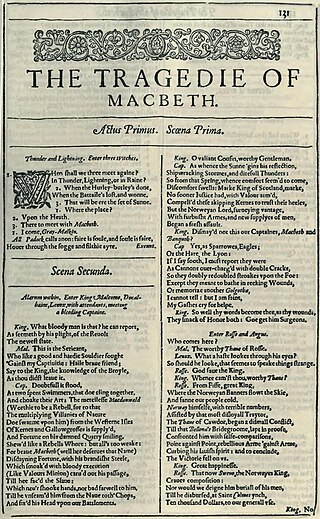
The Tragedy of Macbeth, often shortened to Macbeth, is a tragedy by William Shakespeare. It is thought to have been first performed in 1606. It dramatises the physically violent and damaging psychological effects of political ambitions to power. It was first published in the Folio of 1623, possibly from a prompt book, and is Shakespeare's shortest tragedy. Scholars believe Macbeth, of all the plays that Shakespeare wrote during the reign of King James I, contains the most allusions to James, patron of Shakespeare's acting company.
Lord Macduff, the Thane of Fife, is a character and the heroic main protagonist in William Shakespeare's Macbeth (c.1603–1607) that is loosely based on history. Macduff, a legendary hero, plays a pivotal role in the play: he suspects Macbeth of regicide and eventually kills Macbeth in the final act. He can be seen as the avenging hero who helps save Scotland from Macbeth's tyranny in the play.
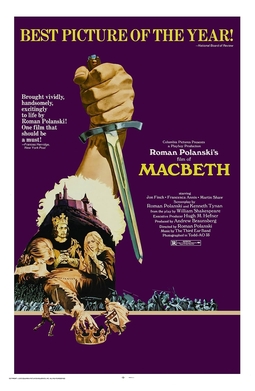
Macbeth is a 1971 historical drama film directed by Roman Polanski, and co-written by Polanski and Kenneth Tynan. A film adaptation of William Shakespeare's tragedy of the same name, it tells the story of the Highland lord who becomes King of Scotland through treachery and murder. Jon Finch and Francesca Annis star as the title character and his wife, noted for their relative youth as actors. Themes of historic recurrence, greater pessimism and internal ugliness in physically beautiful characters are added to Shakespeare's story of moral decline, which is presented in a more realistic style.
Fleance is a figure in legendary Scottish history. He was depicted by 16th-century historians as the son of Lord Banquo, Thane of Lochaber, and the ancestor of the kings of the House of Stuart. Fleance is best known as a character in William Shakespeare's play Macbeth, in which the Three Witches prophesy that Banquo's descendants shall be kings. Some screen adaptations of the story expand on Fleance's role by showing his return to the kingdom after Macbeth's death.

Macbeth is an opera in four acts by Giuseppe Verdi, with an Italian libretto by Francesco Maria Piave and additions by Andrea Maffei, based on William Shakespeare's play of the same name. Written for the Teatro della Pergola in Florence, Macbeth was Verdi's tenth opera and premiered on 14 March 1847. It was the first Shakespeare play that Verdi adapted for the operatic stage. Almost twenty years later, Macbeth was revised and expanded into a French version and given in Paris on 21 April 1865.

Macbeth is a 1948 American historical drama directed by Orson Welles. A film adaptation of William Shakespeare's tragedy of the same name, it tells the story of the Scottish general who becomes the King of Scotland through treachery and murder. The film stars Welles in the lead role and Jeanette Nolan as Lady Macbeth.
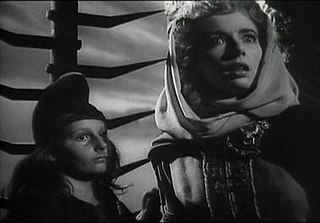
Macduff's son is a character in William Shakespeare's tragedy Macbeth (1606). His name and age are not established in the text; however, he is estimated to be 7–10 years of age. He is Shakespeare's typical child character—cute and clever. While Lady Macduff and her children are mentioned in Holinshed's Chronicles as the innocent victims of Macbeth's cruelty, Shakespeare is completely responsible for developing Macduff's son as a character. The boy appears in only one scene (4.2).

Macbeth is a 2006 Australian adaptation of the play by William Shakespeare of the same name. It was directed by Geoffrey Wright and features an ensemble cast led by Sam Worthington in the title role. Macbeth, filmed in Melbourne and Victoria, was released in Australia on 21 September 2006.
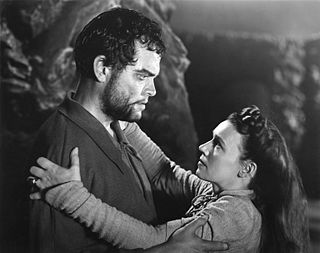
Lord Macbeth, the Thane of Glamis and quickly the Thane of Cawdor, is the title character and main protagonist in William Shakespeare's Macbeth. The character is loosely based on the historical king Macbeth of Scotland and is derived largely from the account in Holinshed's Chronicles (1577), a compilation of British history.

Holinshed's Chronicles, also known as Holinshed's Chronicles of England, Scotland, and Ireland, is a collaborative work published in several volumes and two editions, the first edition in 1577, and the second in 1587. It was a large, comprehensive description of British history published in three volumes.

The Three Witches, also known as the Weird Sisters, Weyward Sisters or Wayward Sisters, are characters in William Shakespeare's play Macbeth. The witches eventually lead Macbeth to his demise, and they hold a striking resemblance to the three Fates of classical mythology. Their origin lies in Holinshed's Chronicles (1587), a history of England, Scotland and Ireland. Other possible sources, apart from Shakespeare, include British folklore, contemporary treatises on witchcraft as King James VI of Scotland's Daemonologie, the Witch of Endor from the Bible, the Norns of Norse mythology, and ancient classical myths of the Fates: the Greek Moirai and the Roman Parcae.
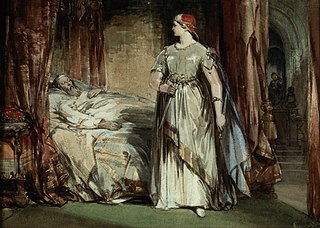
King Duncan is a fictional character in Shakespeare's Macbeth. He is the father of two youthful sons, and the victim of a well-plotted regicide in a power grab by his trusted captain Macbeth. The origin of the character lies in a narrative of the historical Donnchad mac Crinain, King of Scots, in Raphael Holinshed's 1587 The Chronicles of England, Scotland, and Ireland, a history of Britain familiar to Shakespeare and his contemporaries. Unlike Holinshed's incompetent King Duncan, Shakespeare's King Duncan is crafted as a sensitive, insightful, and generous father-figure whose murder grieves Scotland and is accounted the cause of turmoil in the natural world.

The Real Thing at Last is a "lost" satirical silent movie based on the play Macbeth. It was written in 1916 by Peter Pan creator and playwright J. M. Barrie as a parody of the American entertainment industry. The film was made by the newly created British Actors Film Company in response to news that American filmmaker D. W. Griffith intended to honor the 300th anniversary of William Shakespeare's death by producing of a film version of the play. It was subtitled A Suggestion for the Artists of the Future. It was screened at a charity benefit attended by the royal family, but was not widely distributed, and no copies are known to survive.

The Voodoo Macbeth is a common nickname for the Federal Theatre Project's 1936 New York production of William Shakespeare's Macbeth. Orson Welles adapted and directed the production, moved the play's setting from Scotland to a fictional Caribbean island, recruited an entirely Black cast, and earned the nickname for his production from the Haitian vodou that fulfilled the role of Scottish witchcraft. A box office sensation, the production is regarded as a landmark theatrical event for several reasons: its innovative interpretation of the play, its success in promoting African-American theatre, and its role in securing the reputation of its 20-year-old director.
Macbeth is a 1979 videotaped version of Trevor Nunn's Royal Shakespeare Company production of the play by William Shakespeare. Produced by Thames Television, it features Ian McKellen as Macbeth and Judi Dench as Lady Macbeth. The TV version was directed by Philip Casson.

Sleep No More is the New York City production of an immersive theatre work created by the British theatre company Punchdrunk. It is based primarily on William Shakespeare's Macbeth, with additional inspiration taken from noir films and the 1697 Paisley witch trials. Its title comes from Macbeth:

Macbeth is a 2015 epic historical drama film directed by Justin Kurzel and written for the screen by Todd Louiso, Jacob Koskoff, and Michael Lesslie, based on the Shakespeare play. The film stars Michael Fassbender in the title role and Marion Cotillard as Lady Macbeth, with Paddy Considine, Sean Harris, Jack Reynor, Elizabeth Debicki and David Thewlis in supporting roles. The story follows the Scottish lord's rise to power after receiving a prophecy from a trio of witches that one day he will become King of Scotland. Like the play it was adapted from, the film dramatises the damaging physical and psychological effects of political ambition on those who seek power for its own sake.

The Third Murderer is a character in William Shakespeare's tragedy Macbeth (1606). He appears in one scene (3.3), joining the First and Second Murderers to assassinate Banquo and Fleance, at the orders of Macbeth.

The Tragedy of Macbeth is a 2021 American historical thriller film written, directed and produced by Joel Coen, based on the play Macbeth by William Shakespeare. It is the first film directed by one of the Coen brothers without the other's involvement. The film stars Denzel Washington, Frances McDormand, Bertie Carvel, Alex Hassell, Corey Hawkins, Harry Melling, Kathryn Hunter, and Brendan Gleeson.
